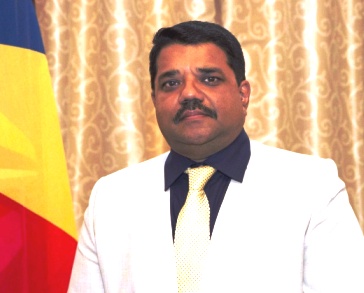Seychellois should access the best possible medical care, says Dr Menon |30 May 2015
Seychellois should be able to access the best possible medical care and the Health Care Agency is working on decentralising its specialisation services to bring them closer to the people.
to bring them closer to the people.
Dr Suresh Menon, chief executive of the Health Care Agency (HCA) of the Ministry of Health, said this to Seychelles NATION in an interview on Thursday in his office at the Seychelles Hospital.
Deputised here by the Abu Dhabi government which also pays his salary, Dr Menon said it is his duty to give the people of Seychelles the right information following the publication of baseless accusations by some opposition politicians.
Dr Menon explained that the Seychelles health care system stands to gain a lot from AMSA Renal Care, the world’s leading renal care providers based in Dubai, UAE, which is bringing world class dialysis to Seychelles after taking over the management of the renal care facilities on April 1, 2015.
Under the deal which Dr Menon has described as a “well-studied decision on the part of the Seychelles government”, AMSA Renal Care is providing dialysis sessions to all Seychellois at a capped price of US $200 per session compared to the US $269 the Ministry of Health was paying for every session.
“This is a very good deal under the five-year contract. The government will make a US $69 benefit on every dialysis session but the quality of care will be much better. We have 120 patients on dialysis here and they all need at least two or three sessions a week. For one patient we will be making a saving of US $9,936 a year. Another reason behind the decision to award the contract to AMSA Renal Care is that the ministry forecasted an increase in the number of dialysis patients because of the alarming rate of diabetes and cardiovascular diseases which help to damage the kidney,” said Dr Menon.
He also said AMSA Renal Care will also place a British-trained nephrologist at the dialysis centre and an American-qualified physician on Praslin and he will also cater for patients from La Digue.
“They will invest US $10 million in the Seychelles health care over the next five years, upgrade the laboratory services and intensive care unit, train all Seychellois staff, and make the dialysis centre an international accreditation centre in 10 months’ time. After the centre has achieved international accreditation Seychelles will be able to develop medical tourism as there are many people who are financially well off but cannot travel to any destination, but only to those with internationally accredited dialysis centres. And part of the money will also go back into the system to further improve our health services,” said Dr Menon.
The chief executive added that more specialised doctors will be coming to Seychelles under the Abu Dhabi fund to raise the level of medical practice to the next level, and he explained that the aim of the Health Care Agency is to have pediatricians and gynecologists in all regional centres as it wants to penetrate into community health.
Dr Menon noted that with the help of other partners, the agency has been able to clear the backlog of different health cases as a result of the unavailability of the operating theatres which were under renovation. Only recently, the agency and the Lion’s Club of Seychelles ran eye camps during which children’s eyes were tested and there were also operations to remove cataracts. Only two weeks ago 17 Seychellois women had breast reduction surgeries and each surgery costs between 10,000 and 30,000 euros. The surgeons did the operations for free and the Health Care Agency only paid for their airfares and lodging.
He added that there will be a major cardiology camp on Mahé, Praslin and La Digue where more cases will be treated.
But Dr Menon stressed that all these are short term solutions and it is necessary for Seychelles to be self-sufficient in terms of medical practitioners in the next 15 years.
“What we need to do is invest in the training of doctors, nurses, allied health workers, paramedics, lab technicians and health administrators among others. We have identified some countries where we plan to send our people for training,” said Dr Menon.
He added: “This country needs good doctors, good services for the people and we are trying to put in place a good system to address the situation. We have to differentiate between the needs and the expectations. We all want the sky but we have to address the needs first. Health workers at all levels will have to be accountable and there should be a change of mindset in the people. People should start thinking about what the government is trying to do. As the government strategises to bring the best for them, they should realise that every visit to the doctor is costing the government a minimum R670. You also have free education and this is not the case in many other countries,”
Dr Menon also noted that he is here to do service for the people of Seychelles and wants to realise President James Michel’s vision – giving the people the best possible heath care.
He also pointed that because it is very easy to criticise and much more difficult to construct, people who want to make negative criticisms should look for facts first and not mislead the people.




